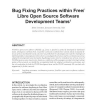105 search results - page 4 / 21 » Latent social structure in open source projects |
155
Voted
CSCW
2012
ACM
13 years 9 months ago
2012
ACM
We report on a study of the English edition of Wikipedia in which we used a mixed methods approach to understand how nested organizational structures called WikiProjects support c...
114
click to vote
HICSS
2009
IEEE
15 years 8 months ago
2009
IEEE
Due to their characteristics and claimed advantages, several researchers have been investigating free and open-source projects. Different aspects are being studied: for instance, ...
149
Voted
AC
2007
Springer
15 years 1 months ago
2007
Springer
The focus of this chapter is to review what is known about free and open source software development (FOSSD) work practices, development processes, project and community dynamics,...
168
click to vote
CSCW
2012
ACM
13 years 9 months ago
2012
ACM
Social applications on the web let users track and follow the activities of a large number of others regardless of location or affiliation. There is a potential for this transpare...
126
Voted
JDM
2008
15 years 1 months ago
2008
Free/libre open source software (FLOSS, e.g., Linux or Apache) is primarily developed by distributed teams. Developers contribute from around the world and coordinate their activi...

